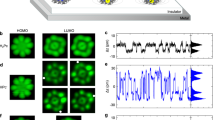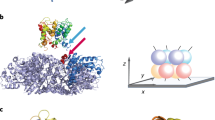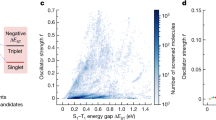Abstract
IN an important paper1 Wawilow has reported measurements on the polarisation of fluorescence of solutions of some dye-stuffs in glycerine, when excited by radiations of different wave-lengths. Using for excitation the radiations from a mercury lamp, isolated by a quartz monochromator, he finds that the degree of polarisation shows a marked dependence on the wave-length of the exciting light. Starting from the visible region of the spectrum, as the wavelength of the exciting light is diminished the degree of polarisation decreases rapidly, passes through a minimum value (corresponding, in genera], to excitation by λ3125–3131), and rises again as we proceed farther towards the ultra-violet. The minimum value is usually negative; that is, the intensity of the fluorescent vibrations along the direction of propagation of the incident light is greater than that of vibrations in the perpendicular direction.
This is a preview of subscription content, access via your institution
Access options
Subscribe to this journal
Receive 51 print issues and online access
$199.00 per year
only $3.90 per issue
Buy this article
- Purchase on Springer Link
- Instant access to full article PDF
Prices may be subject to local taxes which are calculated during checkout
Similar content being viewed by others
References
Z. Phys., 55, 690; 1929.
Author information
Authors and Affiliations
Rights and permissions
About this article
Cite this article
KRISHNAN, K., MITRA, S. Negative Polarisation in Fluorescence. Nature 131, 204–205 (1933). https://doi.org/10.1038/131204b0
Issue Date:
DOI: https://doi.org/10.1038/131204b0
Comments
By submitting a comment you agree to abide by our Terms and Community Guidelines. If you find something abusive or that does not comply with our terms or guidelines please flag it as inappropriate.



